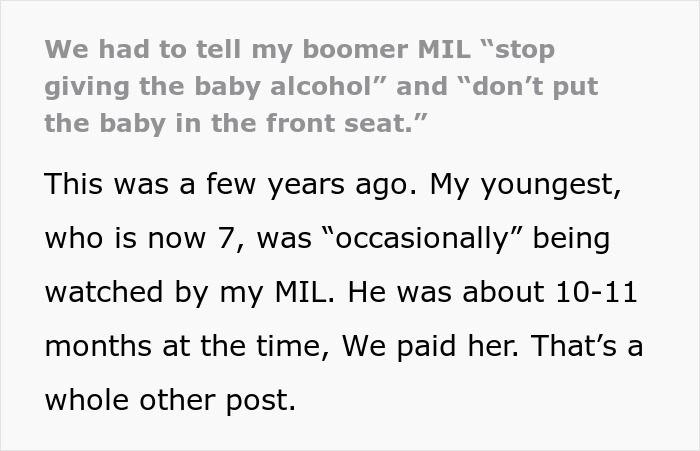It’s a blessing to have grandparents who are kind and present. Not only do they spoil you with amazing gifts and delicious food, but they also share embarrassing moments from your parents’ childhood. But here’s the thing: parenting approaches that were considered acceptable by the baby boomer generation may no longer align with modern values and beliefs. After all, some of the practices from decades ago are now considered harmful.
For instance, a woman took to the r/BoomersBeingFools subreddit to share her mother-in-law’s unconventional parenting methods. Her husband’s mom gave booze to their teething infant and didn’t even use a car seat while driving with the baby. When confronted, the boomer grandmother said that’s how things were done in “her day.” Keep reading to see how the story unfolds.
Different generations tackle parenting differently, but some approaches can endanger a child’s safety
Image credits: Polina Tankilevitch / pexels (not the actual photo)
A couple confronted the husband’s mother and gave her an earful
Image credits: Polina Tankilevitch / pexels (not the actual photo)
Image credits: Alexander Grey / unsplash (not the actual photo)
Image credits: Prestigious_Neat_307
Some approaches from boomer-era parenting are now outdated
If you are a parent, chances are you might have clashed with your mom and dad about how to raise kids. For instance, back in the day, some folks were stingy while praising their children, as they believed it would make them egoistic. So, if you came in second in a race, instead of applause, you were asked to try harder and secure the first position. In such cases, one had to work really hard to earn their boomer parents’ appreciation.
The boomer generation refers to individuals born between 1946 and 1964, which means they are possibly grandparents now. However, many couples that belong to Gen X or Gen Y believe that positive reinforcement and encouragement are important for building their little one’s self-esteem and confidence. People try to celebrate their little achievements to show that it’s the effort that counts.
In boomer-era parenting, traditional gender roles were quite prevalent. Boys were often encouraged to focus on ‘manly’ sports. They were expected to be tough and stoic. On the other hand, girls were presumed to be nurturing and compliant. Over the years, these stereotypes have been challenged, and children are motivated to explore their interests regardless of gender.
Another important shift that happened was the outlook on mental health. Previous generations often overlooked the fact that children might be struggling with anxiety, depression, or other challenges. Over the years, awareness about the importance of mental health has increased, encouraging moms and dads to provide children with the support they need to thrive emotionally.
Some individuals from the baby boomer generation believed that spanking was an acceptable form of discipline. For instance, if a kid didn’t do their homework, they would be smacked. However, research indicates that when you physically punish a kid, it can have a negative impact on their mental well-being. But choosing positive techniques, like guiding kids, is more beneficial in the long run.
If your child hasn’t completed their school work, you can ask them what’s wrong and try to help them finish the assignment. As societal values about parenting have shifted over time, it has led to a change in the way parents raise kids today. What was considered effective decades ago may no longer be acceptable due to new approaches that are less harmful.
Many couples in the US follow their mom and dad’s parenting style
Image credits: Kelly Sikkema / unsplash (not the actual photo)
As per a recent report by the Pew Research Center, which surveyed over 3,700 parents in the U.S., 43% of people mentioned that they raised their children in a similar way that they were raised. This goes on to show that not all parenting techniques by boomer parents are outdated now. They also had some tips and tricks up their sleeves when it came to teaching and disciplining kids.
At the same time, 44% are taking an entirely different approach when it comes to parenthood. Their approach included having open and honest conversations with their children about anything and everything. They believe that this helps the kids to discuss things on their minds freely without fear of being judged.
Individuals with a different approach also pointed out how they give their sons and daughters more love than what they received growing up. They don’t hold back while showing affection for their kids. Saying ‘I love you’ or ‘Take care; I miss you’ is a common practice for them.
Irrespective of your parents approach, there are times you will rely on your loved ones to take care of your kids. But do you think it’s acceptable for friends and family to reinforce their questionable techniques, like not using a car seat, on your child? How would you handle this situation? Tell us about a boomer parenting approach that you don’t like or agree with.






















:quality(70)/cloudfront-us-east-1.images.arcpublishing.com/cmg/TMIMSW765BEYJEPLH7Q3DMRVWY.jpg?w=360&resize=360,270&ssl=1)

